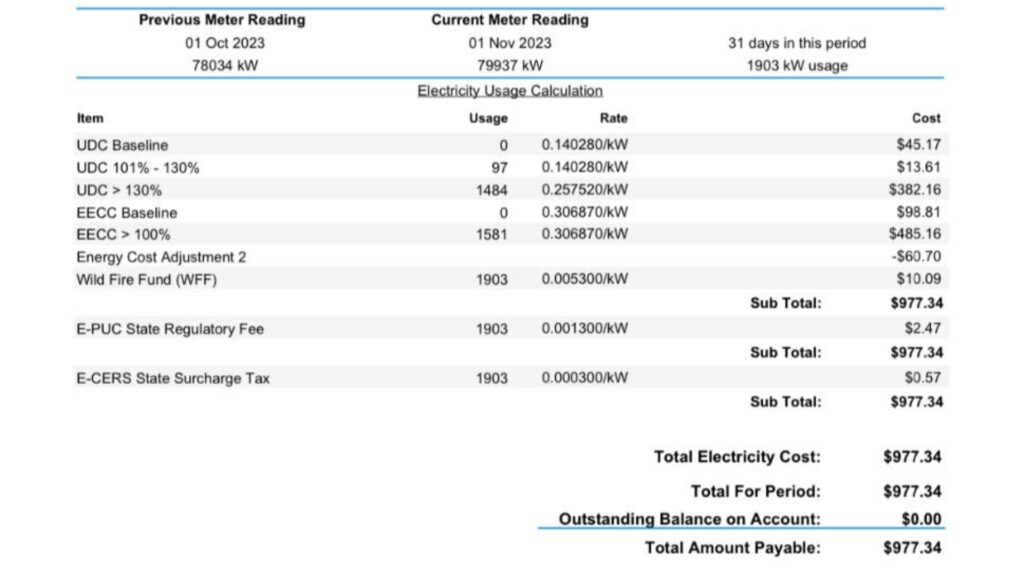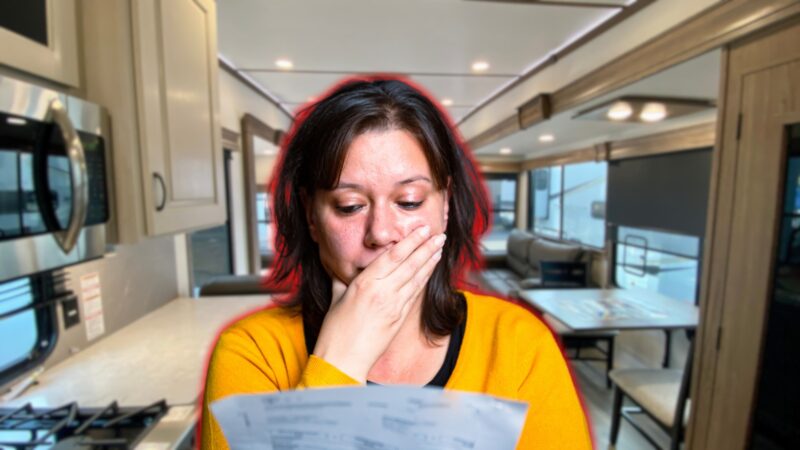Table of Contents Show
Some months, your electric bill can hit your bank account harder than others. However, one full-time RVer was quite surprised when her statement arrived.
While she had received costly utility bills in the past, this one was unexplainable. With more questions than answers, she ran to Facebook to let out her frustration.
Today, we’ll share this RVers experience and the lessons you can learn from it.
Let’s get going!
Full-Time RVer Gets Shocking Electric Bill
Having lived in Florida and California, we’ve received our fair share of expensive electric bills. One full-time RVer, Kimberly S., recently received an electric bill much more than we’ve ever paid. You can imagine her surprise when she opened her statement from the campground to see that it claimed she owed almost $977.34.
As she attempted to wrap her brain around the situation, she posted screenshots of the invoice. Other members were equally as shocked as she was about the amount. Some sympathized with her, while others said it was the price of living in Southern California. The bottom line was that this RVer was on the hook to the electric company.

Why Was Their Electric Bill So Expensive?
So, what could cause you to have a $1,000 electric bill in an RV? For starters, an error on the electric company’s end. In this situation, the person reading the meters was new and made a mistake when reading the meter.
The electric company reread the meter and changed her bill to approximately $350. While this is still a relatively expensive electric bill, it was below average for this RVer. It’s no secret that electricity in Southern California comes with a premium price tag.
Whether you live in an RV or a house, if you receive a bill that you believe to be too high for your typical usage, always call the company. We’re sure the company would have gladly taken payment if this woman didn’t say anything and just paid the bill. You can always request another meter reading.
How to Save Money on Electricity While RVing
Electricity usage often gets included in the nightly reservation rate for an RV. On the other hand, most RV parks and campgrounds with extended stays use meters to track utility usage and charge additional fees. If you’re ever at one of these sites, here are some tips to help you save money on your electricity.
Use Propane for Heating
While the electric fireplace in your camper may keep your RV nice and toasty, it won’t be cheap to run if you pay for electricity. These appliances can use between 1,000 and 1,500 Watts. They can be great for taking the chill out of the air but expensive if they’re your primary heat source.
When you compare the cost of using propane vs electric heat, it’s typically around 25% cheaper to use propane. Sure, you’ll have to keep track of how much propane you have, but it’s worth saving a few bucks.
If you have multiple tanks, you can avoid running out of propane by only opening one tank at a time. This way, when you run out, you can open the other tank and take the empty one to get refilled. Otherwise, you could have two empty tanks, which make for a long, cold night.
RVers also love the Mr. Heater brand. They have multiple different sizes of portable propane heaters in the Buddy line. They are safe to use indoors and have an auto shut-off feature if tipped over.
Keep in Mind: Do you have an RV Propane Detector? If not, you should, and these are some of the best options!
- 4,000- to 9,000-BTU radiant heater for spaces up to 225 square feet. Approved for outdoor use; clean-burning; nearly...
- When operating the heater at altitudes over 7,000 FT above sea level the heater may shut off.
Upgrade Your RV’s Electrical System
If you need another excuse to upgrade your RV’s electrical system, now you have one! You can reduce your monthly utility bills by upgrading your battery bank to lithium batteries and installing an inverter and solar panels. Just because a power source is available doesn’t mean you have to use it. Instead, you can harness power from the sun to keep your lights on.
If you go this route, you can offset the costs of installing the system with every penny you save. Over time, your upgrades could pay for themselves.
Monitor Your Own Power
Unfortunately, many RVers have to take the electric company’s word for it when reading their meter. As the RVer in our main story demonstrated, people aren’t perfect, and mistakes can happen.
Whether you have trust issues now or want to keep an eye on your usage, there are products to do that. Some RV surge protectors allow you to keep track of your power usage via Bluetooth. This could be useful if you receive an invoice that’s more than you expected.
- ⏲️【Power Monitoring and Scheduling】:Keep an eye on your RV's power usage with the integrated KWH usage meter....
- 📶【Seamless Wi-Fi Connectivity】:P2 Smart Wi-Fi RV surge protector’s advanced Wi-Fi connectivity allows you to...
Park in the Shade
Just like the sun can heat the inside of a car, it’ll do the same for an RV. During the heat of summer, it can make it nearly impossible to keep your camper cool. Even with a couple of air conditioners, you could watch the thermostat climb higher and higher.
One of the best ways to keep your rig cool is to park it in the shade. Keeping the hot sun from beating down on your RV can help your air conditioners do their job. The more help you can give your air conditioners, the less they’ll have to run. The less they run, the lower your electric bill will be at the end of the month.
Remember: If you struggle to keep temperatures down in your rig, try Shade RV to beat the heat!
Travel with the Weather
Many RVers make it their goal to chase 75 degrees. For many, this is the perfect temperature, where they don’t have to use heat or air conditioning. You’ll enjoy lower utility bills by not relying on these power-hungry appliances.
It’s important to remember that Mother Nature has a mind of her own. Not long ago, RVers throughout Texas experienced severe damage when temperatures plunged below freezing. No matter where you travel, you must watch the weather forecast.
Avoid a Costly RV Electric Bill
When staying in a long-term RV spot, you’ll likely be footing the bill for your utility usage. If you follow the tips we’ve shared, you can avoid a surprise at the end of the month. Now that you’re paying the electric bill, you can understand why parents constantly tell kids to turn off lights and close doors.
Last update on 2024-12-26 / Affiliate links / Images from Amazon Product Advertising API









We received an electric bill that was higher than our several years annual amount. Several calls to several people at different offices (we get billed by the supplier and the carrier) finally revealed the issue. The company estimates usage one month and actually reads the meter the next. Our use was way below the estimate (probably out camping) so when they actually read the meter it was lower than the previous estimated ‘reading’. The basically charged us for the entire capacity of the meter’s capability to record. I sympathize with this fellow RVer!
I take a picture of the meter reading with my cell phone when I check in and when I depart or at the end of the month if I have booked for multiple months. I then have a record of what the reading really was.